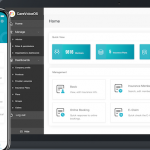The digital health sector shows no signs of slowing down. Startup Health, an organization that supports and fosters digital health startups, announced that funding totaled $14.2 billion in 2018, which is 14 times more than it was in 2010. The past year saw the average deal size grow by $3 million–to roughly $20 million–as investors nearly doubled their investments.
In the last quarter alone, startups secured larger deals across all stages, with the average Series A round today (about $10 million) matching the size of a Series C in 2014. Some standout deals marked the past year, including Peloton, which snagged $550 million in new funding, and Smile Direct Club’s recent round of $380 million.
“Growth may be the norm in digital health these days, but this blockbuster year bears the markings of a reinvention of an entire sector, rather than a bubble stretching thinner as it expands,” notes the Startup Health 2018 Q4 Insights Report. “The market is sturdy and ready for continued transformation with big multinational corporations, local industry players, and startups capturing maximum share and establishing their unique market positions.”
At this point, nearly every healthcare sector has expanded into digital in some way or another. Companies that aim to help patients navigate the healthcare industry witnessed the most funding, followed by telemedicine, patient engagement, and primary care. Startup Health found that newer niche sub-sectors also saw increased funding, most notably machine learning, blockchain, artificial intelligence, and the Internet of Things.
Want to publish your own articles on DistilINFO Publications?
Send us an email, we will get in touch with you.
Startups in the mental health sector, meanwhile, received record-breaking funding with a total of $602 million. Of those companies, 77% focused on mobile apps for patients and consumers alike. Doctor on Demand, which lets users quickly connect with a psychologist or psychiatrist, raised $73 million.
But despite impressive strides in industry funding, StartUp Health cofounder and president Unity Stoakes notes an interesting paradox: “Health innovation today is progressing slower than we think and faster than we ever dreamed possible–at the same time,” he wrote in a recent blog post.
Stoakes suggests that while 2018 points to an overall push in digital health, there is still an overwhelming trend to rely on “incremental, band-aid innovation” to appease current consumer trends versus leaping beyond outdated foundations and infrastructures. Gradual change is trumping bigger disruption, but global wellness might be better served by bold moves—such as leveraging large platforms like Amazon or Apple, reimagining standard business models, or pushing for unorthodox partnerships.
“What if Kaiser Permanente teamed up with Tesla to turn your ride to work into a daily health checkup?” asks Stoakes.
StartUp Health’s cofounder shares several more ideas as to how the health industry can adapt and transform in the coming years. The past year may have been a standout year in funding, he explains, but there’s still much work to do if the industry hopes to better serve universal health solutions. Read more on the Startup Health website.
Date: January 23, 2019
Source: FastCompany








